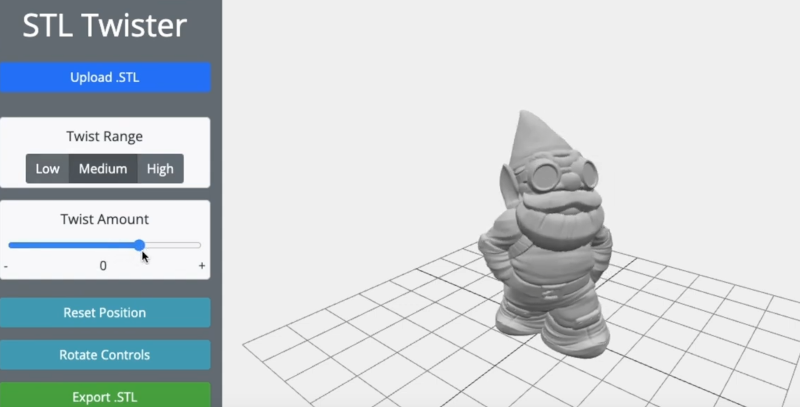When we think about sending an STL off on the Internet for processing, we usually want someone to print it for us or we want mesh repair. But [Chuck] found an interesting project on GitHub from [Andrew Sink] that will let you add a variable amount of twist to any STL and then return it to you for printing or whatever else you use STLs for. If you don’t get what we mean, check out the video below.
The site that does the work initially loads a little gnome figure if you are too lazy to upload your own model. That’s perfect, though, because the little guy is a good example of why you might want to twist a model. With just a little work, you can make the gnome look in one direction or even look behind him.
[Chuck] shows how to use the tool for artistic effect by twisting his standard cube logo. The result is something that looks like it would be difficult to create, but could hardly be easier. The tool lets you rotate the object, too, so you can get the twist effect in the right orientation for what you want to accomplish. A great little tool for making more artistic 3D prints without learning new software. If you want some fun, you can try the version that uses sound from your microphone to control the twist.
If you’d rather twist in CAD, we can help. If you really want artsy 3D printing, you probably need to learn Blender.
















Thanks for the write-up! As a few people noticed on Chuck’s video, the twist function doesn’t subdivide low poly models, so models that have only a few triangles can get distorted after twisting.
Adding a remesh step before twisting would be a great way to solve this. Another thing to add to my list of things to do!
One thing I would like to see done is a way to flatten prints. The Star Trek novel “Dreadnought” has a three-nacelle ship painting on the cover that looks a bit comical—so I’d love to flatten and street h it.
We also need a “make mirror” setting so you can scan an object and flip it to print a mirror image.
O/T
Sometimes, the supporting structures interest me more than what is printed.
Lots of things wind up looking like the Cygnus from THE BLACK HOLE.
Porous prints:
https://techxplore.com/news/2024-06-3d-strategy-gradients-porous.html
I can help you with the Mirror part!
https://andrewsink.github.io/MeshMirror/
An alternative would be to not do any remeshing at all, and perform the ‘twist’ at or just after (i.e. postprocessor) the slicing stage, since a fixed rotation per layer is what you’re trying to achieve by mesh-bashing in the first place.
“If you want some fun, you can try the version that uses sound from your microphone to control the twist.”
Twist and Shout!
(That’s the name of an old song for you younger folks)
Just no shaking a baby now
That’s neat, and kudos to the developer but this is much better done in Blender. It’s called lattice or mesh deformation. Really easy to do and gives lots more control. Multi-axis twisting, etc.
Hmm… I’m experiencing some problems with the app. I’ve uploaded a cylinder, applied the twist but I didn’t see any changes. So, I tried a sphere, but again to no result. I’ve even rotated the sphere 180deg before applying the twist, but that didn’t help either. I guess this app just isn’t for me.
Better a smart 🫏 than a dumb one I guess
Whatever you do, don’t learn blender thinking you can do ‘art’ with it.
Unless you consider fighting the worlds _worst_ most tedious UI ‘art’.
‘Blender has made me as frustrated and mad as the queen was at the SexPistols…’
Blender UI is DaDa, perhaps BullDaDa.
Artsy fartsy types should get something like Shapelab. They will be MUCH happier.
All right.
Thanks for playing
If there’s a tool you can’t make art with, the fault is not in the tool.
If great art is born of pain, Blender is definitely the way to go.
I gave this a brief play recently. The difficulty I found was that I could not move the model relative to the axis of twist, resulting in undesirable effects.
Undesirable effects might play a role.
An artifact of a print—I might use to show a figure caught in a VR “glitch” or transporter accident like at the beginning of Star Trek: The Motion Picture.
A lazy way to helicalise your gears? Don’t think you’d be able to do herringbone with this in its current form though.